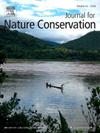REDD+在非洲的实施:REDD+冲突管理案例
IF 2.5
3区 环境科学与生态学
Q2 BIODIVERSITY CONSERVATION
引用次数: 0
摘要
《联合国气候变化框架公约》(UNFCCC)首次提出减少森林砍伐和退化造成的排放(REDD+)计划,作为应对全球变暖和气候变化的机制,至今已有18年。在此期间,许多REDD+项目出现在森林资源丰富的发展中国家,其中许多在非洲。同样,大量文献研究了在非洲如何管理REDD+项目以及它们带来的挑战。具体地说,关于非洲与REDD+框架相关的冲突的科学文献越来越多,尽管是零散的。这种不完整的信息库阻碍了关于非洲REDD+冲突管理的综合研究议程的发展,并阻碍了为非洲国家设计解决实际和潜在冲突的适应性REDD+政策的努力。本文通过使用自动化内容分析(ACA)工具Leximancer(5.0版)系统地回顾非洲REDD+冲突相关问题,并采用资源冲突、集体行动和社会生态复原力(RCCASER)框架进行分类,以改进目前关于非洲REDD+冲突管理的知识体系,从而有助于弥合这一知识差距。我们的研究结果表明,非洲的REDD+冲突体现在与森林获取、土地权属、社区参与、利益分享和结构调整相关的问题上。为了促进项目的顺利实施,确保所有利益相关者的双赢结果,同时确保实现REDD+目标,未来的研究应考虑对本研究中确定的REDD+冲突相关主题进行实地研究。本文章由计算机程序翻译,如有差异,请以英文原文为准。
The implementation of REDD+ in Africa: The case of REDD+ conflict management
It has been eighteen years since the Reducing Emissions from Deforestation and Degradation (REDD+) program was first introduced by the United Nations Framework Convention on Climate Change (UNFCCC) as a mechanism to fight against global warming and climate change. During this time, many REDD+ projects have emerged in forest-rich countries throughout the developing world, many in Africa. Equally, a large amount of literature has examined how REDD+ projects are managed in Africa and the challenges they present. Specifically, there is a growing body of scientific literature on conflicts linked to the REDD+ framework in Africa, albeit fragmented. This incomplete information base hinders the development of a comprehensive research agenda on REDD+ conflict management in Africa and dampens efforts towards the design of adaptive REDD+ policies that address actual and potential conflicts for African nations. This paper contributes to bridging this knowledge gap by systematically reviewing REDD+ conflict-related issues in Africa using the automated content analysis (ACA) tool, Leximancer (edition 5.0), and employing the resource conflict, collective action, and social-ecological resilience (RCCASER) framework for categorization to improve the current body of knowledge on REDD+ conflict management in Africa. Our findings suggest that REDD+ conflicts in Africa manifest around issues related to forest access, land tenure, community participation, benefit sharing, and structural adjustment. To enhance the smooth implementation of projects that ensure win–win outcomes for all stakeholders while ensuring that REDD+ objectives are met, future research should consider field research on the REDD+ conflict-related themes identified in this study.
求助全文
通过发布文献求助,成功后即可免费获取论文全文。
去求助
来源期刊

Journal for Nature Conservation
环境科学-生态学
CiteScore
3.70
自引率
5.00%
发文量
151
审稿时长
7.9 weeks
期刊介绍:
The Journal for Nature Conservation addresses concepts, methods and techniques for nature conservation. This international and interdisciplinary journal encourages collaboration between scientists and practitioners, including the integration of biodiversity issues with social and economic concepts. Therefore, conceptual, technical and methodological papers, as well as reviews, research papers, and short communications are welcomed from a wide range of disciplines, including theoretical ecology, landscape ecology, restoration ecology, ecological modelling, and others, provided that there is a clear connection and immediate relevance to nature conservation.
Manuscripts without any immediate conservation context, such as inventories, distribution modelling, genetic studies, animal behaviour, plant physiology, will not be considered for this journal; though such data may be useful for conservationists and managers in the future, this is outside of the current scope of the journal.
 求助内容:
求助内容: 应助结果提醒方式:
应助结果提醒方式:


